
News
Behind the Headlines
Two-Cents Worth
Video of the Week
News Blurbs
Articles
Testimony
Bible Questions
Internet Articles (2015)
Internet Articles (2014)
Internet
Articles (2013)
Internet Articles (2012)
Internet Articles (2011)
Internet Articles (2010)
Internet Articles
(2009)
Internet Articles (2008)
Internet Articles (2007)
Internet Articles (2006)
Internet Articles (2005)
Internet Articles (2004)
Internet Articles (2003)
Internet Articles (2002)
Internet Articles (2001)

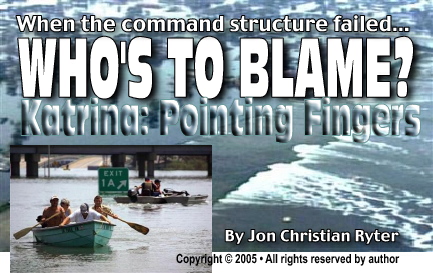
 ut
a public school teacher in the governor's mansion and you'll have
a pedagogue as the chief executive every time. It really doesn't
matter how long she's in office, she'll always be a schoolmarm
who's out of her element and in over her head—the Peter Principle
epitomized.
ut
a public school teacher in the governor's mansion and you'll have
a pedagogue as the chief executive every time. It really doesn't
matter how long she's in office, she'll always be a schoolmarm
who's out of her element and in over her head—the Peter Principle
epitomized. .jpg) Unfortunately
for the people of New Orleans, it took a crisis of cataclysmic
proportions in which thousands of people suffered physical deprivation
and emotional humiliation—and hundreds died before anyone
realized that when you elect a follower as your leader, no one
makes realistic plans for the crisis until a catastrophe occurs,
and while waiting for someone to say, "This way, follow
me..." everyone becomes hopelessly entombed in dispair.
And, that's what happened in New Orleans.
Unfortunately
for the people of New Orleans, it took a crisis of cataclysmic
proportions in which thousands of people suffered physical deprivation
and emotional humiliation—and hundreds died before anyone
realized that when you elect a follower as your leader, no one
makes realistic plans for the crisis until a catastrophe occurs,
and while waiting for someone to say, "This way, follow
me..." everyone becomes hopelessly entombed in dispair.
And, that's what happened in New Orleans.
Louisiana governor Kathleen Babineaux Blanco is one of those pedagogues. She needs to be back teaching classes at Breaux Bridge High School—not the chief executive of a State with life and death authority over people. If the voters of Louisiana are smart in 2007 they will provide her with a job transfer—and send Lt. Governor Mitchell Landrieu packing as well. Both of them fiddled while Rome burned, believing they could best deal with the multitude of problems in New Orleans after the flood waters subsided and the damage caused by Hurricane Katrina could be more safely and accurately assessed. Only, because the levees broke in at least three places rather than simply being breached, the flood waters were not going to subside unless man interceded. Lake Pontchartrain was reclaiming a portion of the city of New Orleans.
 The
tragedy that unfolded in New Orleans in the wake of the floodwaters
of Hurricane Katrina should be a political career-buster.
Between now and the federal elections in November, 2006 and the
gubernatorial elections in 2007, Louisiana's Democratic Party
led by Sen. Mary Landrieu (Mitch Landrieu's sister)
will try to convince the State's 67% black majority that the suffering
they endured during the aftermath of Hurricane Katrina
was the fault of President George W. Bush—who was
too busy enjoying his summer vacation at his ranch in Crawford,
Texas to deal with the tragedy that was unfolding in Louisiana
for five critical days. That's the argument she pushed at the
press conferences she held after Katrina devastated the
Gulf coast—even threatening to punch the president on ABC's
This Week. "If one person criticizes our sheriff's,
or says one more thing, including the President of the United
States," she said, "he will hear from me. One
more word about this after his show airs and I—I will likely
have to punch him—literally."
No one has spoken in a derogatory way about the law enforcement
officers of New Orleans—except perhaps to note that over
400 of them are missing. Several refused to report for extended
duty when the storm hit and the levees broke. Scores of them turned
in their badges and resigned in the darkened city, leaving a security
gap that contributed to the lawlessness that consumed the city.
Landrieu has become the shill of the left that is tryng
to shield Blanco and blame the chaos on Bush.
The
tragedy that unfolded in New Orleans in the wake of the floodwaters
of Hurricane Katrina should be a political career-buster.
Between now and the federal elections in November, 2006 and the
gubernatorial elections in 2007, Louisiana's Democratic Party
led by Sen. Mary Landrieu (Mitch Landrieu's sister)
will try to convince the State's 67% black majority that the suffering
they endured during the aftermath of Hurricane Katrina
was the fault of President George W. Bush—who was
too busy enjoying his summer vacation at his ranch in Crawford,
Texas to deal with the tragedy that was unfolding in Louisiana
for five critical days. That's the argument she pushed at the
press conferences she held after Katrina devastated the
Gulf coast—even threatening to punch the president on ABC's
This Week. "If one person criticizes our sheriff's,
or says one more thing, including the President of the United
States," she said, "he will hear from me. One
more word about this after his show airs and I—I will likely
have to punch him—literally."
No one has spoken in a derogatory way about the law enforcement
officers of New Orleans—except perhaps to note that over
400 of them are missing. Several refused to report for extended
duty when the storm hit and the levees broke. Scores of them turned
in their badges and resigned in the darkened city, leaving a security
gap that contributed to the lawlessness that consumed the city.
Landrieu has become the shill of the left that is tryng
to shield Blanco and blame the chaos on Bush.
On Fox News, Landrieu emphasized that the US Army Corp of Engineers asked Congress for $27 million dollars in last year's omnibus budget bill, but only got $5 million to reinforce the levees around New Orleans. (Let's review: between Bush and Landrieu, which one is in Congress? The last time I read the US Constitution, only Senators and Congressmen could add line items to the legislation voted on by them. Presidents can either sign or veto the entire bill, but they can't add to, or take away from, the legislation sent to them for their signature. Bush signed into law what Congress enacted.
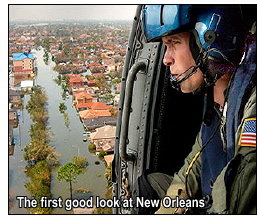 If
anyone's to blame for the appropriations bill having an insufficient
amount of money to repair the levee, let's start by pointing our
finger at Louisiana's two Senators and seven congressmen who failed
to push the leadership of the House and Senate for something their
State obviously needed.) But, the truth is, $27 million—had
every penny been allocated and spent reinforcing the levee—would
not have prevented the disaster from happening since the levee
was constructed to protect the city from up to a category 3 storm.
Everyone has known for over 40 years that the levee system would
not protect New Orleans from a category 5 or even a strong
category 4 hurricane. Further, the money requested in last year's
budget bill was not to be used to reinforce the thickness—or
wall strength—of the levee, but to add to its height. New
Orleans flooded because the levee broke in at least three places.
If
anyone's to blame for the appropriations bill having an insufficient
amount of money to repair the levee, let's start by pointing our
finger at Louisiana's two Senators and seven congressmen who failed
to push the leadership of the House and Senate for something their
State obviously needed.) But, the truth is, $27 million—had
every penny been allocated and spent reinforcing the levee—would
not have prevented the disaster from happening since the levee
was constructed to protect the city from up to a category 3 storm.
Everyone has known for over 40 years that the levee system would
not protect New Orleans from a category 5 or even a strong
category 4 hurricane. Further, the money requested in last year's
budget bill was not to be used to reinforce the thickness—or
wall strength—of the levee, but to add to its height. New
Orleans flooded because the levee broke in at least three places.
To reinforce the entire levee and add sufficient additional height to protect the city from a tidal swell that would be brought ashore by a category 5 hurricane would require an appropriation in the hundreds of millions of dollars—something Congress was not prepared to do since that is money that rightfully should be appropriated from the pockets of the taxpayers of Louisiana—not the taxpayers of New York, Minnesota, Arizona, Alaska, Hawaii and New Mexico.
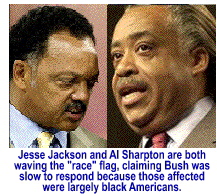 The
argument immediately advanced by racism activists Jesse Jackson
and Al Sharpton—two of the worst racist demogoges
in the country—the Democratic National Committee, and the
antiwar radical left groups like MoveOn.org and Jane
Fonda's new group (formed with al Qaeda's representative of
British Parliament, George Galloway) Stand Up And Be
Counted, is that President George W. Bush did
not react until the public outcry overwhelmed the media. Bush
wasn't concerned, the liberal pundits said, because all of the
rich white folks got out of New Orleans before Hurricane Katrina
blew ashore, and the only people left in New Orleans were the
welfare class poor—who are 90% black and always vote Democratic.
The
argument immediately advanced by racism activists Jesse Jackson
and Al Sharpton—two of the worst racist demogoges
in the country—the Democratic National Committee, and the
antiwar radical left groups like MoveOn.org and Jane
Fonda's new group (formed with al Qaeda's representative of
British Parliament, George Galloway) Stand Up And Be
Counted, is that President George W. Bush did
not react until the public outcry overwhelmed the media. Bush
wasn't concerned, the liberal pundits said, because all of the
rich white folks got out of New Orleans before Hurricane Katrina
blew ashore, and the only people left in New Orleans were the
welfare class poor—who are 90% black and always vote Democratic.
Let's
forget the colorful racist rhetoric for a moment and look at the
facts. From the moment Katrina blew ashore—hours
before the 17th Street levee broke—New Orleans mayor Raymond
Nagin declared martial law over his city and ordered it evacuated.
.jpg) He
tried, in vain, to get Gov. Blanco to turn control of available
National Guard troops over to him. She refused. She did, however,
drive to New Orleans and "stand beside him" while he
ordered the people to evacuate the city. What Nagin should
have done was commandeer all of the school buses in New Orleans
and place them at strategic intersections in the city's poorest
sections to provide exit transportation for those who did not
possess the means to escape the city. However, the buses were
not insured for that purpose.
He
tried, in vain, to get Gov. Blanco to turn control of available
National Guard troops over to him. She refused. She did, however,
drive to New Orleans and "stand beside him" while he
ordered the people to evacuate the city. What Nagin should
have done was commandeer all of the school buses in New Orleans
and place them at strategic intersections in the city's poorest
sections to provide exit transportation for those who did not
possess the means to escape the city. However, the buses were
not insured for that purpose.
Blanco's advisers told her that the remaining 7,000 National Guard troops left in Louisiana were not enough to secure the city of New Orleans, and that it was not in her best political interest to use them until they could be reinforced since they might get hurt, or worse, hurt or kill a civilian they were charged with protecting. Instead, she let Nagin's 1,500 New Orleans cops fend for themselves in a city that had been tacitly surrendered to looters and thugs.
Blanco who, according to Nagin, was not in constant or at least direct contact with the him as the crisis evolved into catastrophe, appeared to have been preoccupied with her own media photo ops advising people to leave the city, which made it appear that she was aware of the plight that was enveloping her State—and that she was swiftly implementing corrective measures to ward off disaster. Like a school teacher passing out unimportant assignments, she outlined the measures that would take place to secure the city of New Orleans and rescue its people. But nothing happened. Why? Because Blanco never took control of the emergency apparatus of Louisiana—and apparently did not want anyone else doing so, either, until she was ready to act.
Her media rhetoric never translated into specific instructions to her department heads. Nor does it appear there was an official request from the State of Louisiana to the Bush Administration for federal assistance until September 2 when federal troops finally assumed control of the Blanco quagmire. Because each State is sovereign, the federal government cannot send federal troops into a State, or declare martial law without authorization from the governor of that State.
Blanco never became the leader the people elected her to be. Not when the 17th Street levee broke, nor when wo other levees broke and the city flooded. Not when the looting began, nor when a dozen rapes in the SuperDome were reported. Not when mobs of thugs took to the streets and ransacked the homes of News Orleans "refugees" who left town before the storm hit, or were trapped in the SuperDome (under a lockdown situation where those law-abiding citizens were not allowed to leave by order of the Blanco Administration—which apparently viewed New Orleans' local "refugees" as potential looters).
Nor did Blanco become a leader when gangs armed with automatic weapons took to the streets and terrorized the people of New Orleans, keeping the Red Cross, medical personnel and other emergency responders from helping the frightened, the hungry, the injured and the dying. Blanco requested large scale federal intervention four days too late. What Gov. Kathleen Blanco should have done—on August 30 or at the latest, on the 31st—was declare martial law; impose a curfew in the affected parrishes, issue a "shoot-to-kill" order on all looters to the National Guard under her control as well as all local, county and State police agencies—and she should have requested federal assistance then, not on Sept. 2 when the situation in New Orleans had become a hopeless quagmire. (It was during this period when mass resignations from the New Orleans police force were taking place.) The media was not told that over 400 New Orleans' cops were AWOL.
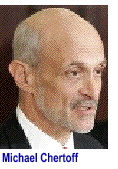 Department
of Homeland Security Secretary Michael Chertoff told
Tim Russert on Meet the Press that Louisiana State
and local officials kept the federal agencies which were thre
to help, in the dark and did not inform DHS or the Federal
Emergency Management Agency [FEMA] of the civil unrest
going on in New Orleans—or the fact that one-third of their
police officers had quit or were otherwise missing-in-action.
Chertoff said he found out about it like the rest of the
American people—from media news reports on Sept. 2. Chertoff
said neither he nor FEMA head Mike Brown were told
of the deteriorating conditions in New Orleans, or the fact that
after the 17th Street levee was breached a second wave of water,
from other broken levees, from Lake Pontchartrain, flooded
the entire city.
Department
of Homeland Security Secretary Michael Chertoff told
Tim Russert on Meet the Press that Louisiana State
and local officials kept the federal agencies which were thre
to help, in the dark and did not inform DHS or the Federal
Emergency Management Agency [FEMA] of the civil unrest
going on in New Orleans—or the fact that one-third of their
police officers had quit or were otherwise missing-in-action.
Chertoff said he found out about it like the rest of the
American people—from media news reports on Sept. 2. Chertoff
said neither he nor FEMA head Mike Brown were told
of the deteriorating conditions in New Orleans, or the fact that
after the 17th Street levee was breached a second wave of water,
from other broken levees, from Lake Pontchartrain, flooded
the entire city.
Nagin
was asked by MSNBC why the city of New Orleans did not
try to help the poor people who did not possess transportation
get out of the city after the evacuation was ordered. Nagin
sidestepped the question by replying that the remaining residents
were told to go to the SuperDome. Chertoff complained
to Russert that while the media was reporting on the disasterous
conditions at the SuperDome, he was—at that moment—in
a video conference with the city and State officials involved
in the operation, and not one person in that meeting mentioned
anything going on at the SuperDome or the Conference Center.
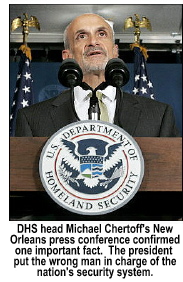 "The
original [FEMA] plan," Chertoff said, "was
to have the SuperDome be the place of refuge of last resort."
"The
original [FEMA] plan," Chertoff said, "was
to have the SuperDome be the place of refuge of last resort."
It's clear, for whatever reason, Blanco wanted to make sure that the Bush Administration was kept out of the loop. I think the most frightening thing about the lack of coordination in New Orleans is the fact that Chertoff is the man who was entrusted the President, and through the advise and consent of the US Senate, with the task of coordinating the security of the United States of America. If he could be blindsided by a handful of petty Louisiana bureaucrats while all of the media in America was openly reporting on the chaos in New Orleans, I've got to wonder whatever possessed the President of the United States to appoint him Seretary of the Department of Homeland Security? And, I've also got to ask how long it will be before the President realizes he made a mistake and corrects that error.
It took Fox News to expose the horror of the pseudo-prison camp at the SuperDome where American citizens were trapped without food and water; where police were under orders to keep them contained there to prevent further incidents of looting. Fox News also reported the gang war in the streets of New Orleans, and that thugs were firing on New Orleans fire fighters as looters tried to break into the Verizon offices in New Orleans. America's outrage finally forced State officials in Baton Rouge—whom it appears were waiting for the flood waters to recede before acting—to wake up and communicate with local officials who were fighting to save a city; and with the Bush Administration which was ready to assume control of the city, restore order and evacuate the remaining people to temporary shelters in other States.
Even
as the media was reporting on the atrocities that were happening
on the ground, those theoretically in charge of emergency operations
appeared to be oblivious of the problems since they communicated
directly with the Governor's office and not with city officials
(whom everyone assumed were communicating with Blanco).
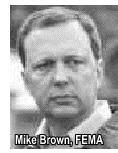 FEMA
Director Michael Brown, an undersecretary of Homeland Security
told reporters that he thought "...the security situation
is pretty darn good." Terry Ebbert, head of the
New Orleans Emergency Management operations said help was
almost nonexistent. What he had seen, he said was "...too
little, too late. FEMA has been here three days,"
he added, "yet there is no command and control. We can send
massive amounts of aid to tusnami victims, but we can't bail out
the city of New Orleans."
FEMA
Director Michael Brown, an undersecretary of Homeland Security
told reporters that he thought "...the security situation
is pretty darn good." Terry Ebbert, head of the
New Orleans Emergency Management operations said help was
almost nonexistent. What he had seen, he said was "...too
little, too late. FEMA has been here three days,"
he added, "yet there is no command and control. We can send
massive amounts of aid to tusnami victims, but we can't bail out
the city of New Orleans."
It was
not until George Bush went to Louisiana and saw first hand
what was not happening that the looting was stopped. And
the Red Cross which, the day before, was afraid to even
enter New Orleans, was feeding the flood victims there in complete
safety. 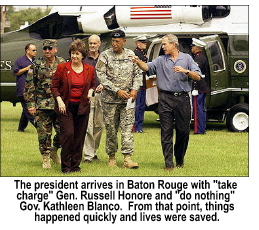 Medical
attention reached the aged and infirm—and the 25 thousand
lock-ins who were living in their own body waste at the SuperDome
were evacuated to temporary shelters outside of the State.
Medical
attention reached the aged and infirm—and the 25 thousand
lock-ins who were living in their own body waste at the SuperDome
were evacuated to temporary shelters outside of the State.
Added to that, the Bush Administration then provided Louisiana with a $100 million grant to provide jobs to 25 thousand displaced people to help with the cleanup from Hurricane Katrina, and temporary 6-month unemployment benefits to those who lost jobs because their places of employment were flooded and may need up to 6 months to get back into operation. Then Bush booked the Carnival Cruise Line through November to provide temporary living quarters for close to half of the displaced people from New Orleans.
Nevertheless, the liberals, trying to help themselves to a double serving of the midterm Election of 2006, will continue to insist that the dehumanization of New Orleans' poor was the fault of George W. Bush, not Gov. Kathleen Blanco. And, by the time the gubernatorial election is held in Louisiana in 2007, Blanco will be claiming the same thing in an attempt to win re-election.
Louisiana politicians have known for at least 40 years that if a Category 4 or 5 hurricane hit New Orleans the levees that protect the below-sea level city would not be able to hold back the tidal surge on the back end of the storm. New Orleans would become the Venice of America—or its Atlantis. For that reason, on August 25—2 days before Hurricane Katrina made landfall—Bush declared portions of Louisiana, Mississippi, Alabama and Florida a major disaster area.Ê Blanco should have declared a state of emergency and asked the federal government to take charge on that date.
Bush's declaration allowed FEMA—which coordinates state and local disaster relief efforts—to make funds and supplies available to the Gulf coast States that were about to feel Katrina's fury. Medical supplies, food and water—and National Guard units were readied. The Red Cross set up a command center in Baton Rouge. But until Blanco declared a state of emergency and invited federal troops into her State, the Bush Administration had done virtually everything it could do.
Several things should have happened as the Category 5 storm bore down on the coast of Louisiana since it was the nightmare storm everyone feared—and theoretically prepared for—for 40 years. But one thing that absolutely nobody could have foreseen or predicted happened in New Orleans that radically changed the rescue-recovery equation once disaster struck.
Correctly, New Orleans mayor Ray Nagin ordered the evacuation of the city. Roughly 65% of the population in the city heeded the warning, locked up their homes and left the city. There is no doubt Nagin's decision to evacuate the city saved many lives. But that appears to be the last correct decision made by a city or State official for four days. While Nagin declared martial law, the New Orleans police department and the Orleans Sheriff's Department did not take immediate tactical control of the city to enforce the curfew imposed by the mayor. Once the city lost electrical power and the streets of the concrete jungle remained dark at night, the armed gangs and vandals that terrorized the population by day terrorized the police by night. Cops, fearful of being ambushed and assassinated by street gangs, refused to patrol the darkened city at night. As a result, anarchy ruled the streets of New Orleans for four days.
Realizing that most of the city is below sea level and that a hurricane of the magnitude of the one bearing down on New Orleans was going to result in major flooding as the levees were breached, someone should have made sure the mass transit vehicles (the city would need to transport those who remained behind) were safely moved to high ground and were out of harm's way. School buses. Public transit buses. Nagin controlled the public transit system of New Orleans. Blanco controlled the city's school buses since they are owned by the State Board of Education. No one moved any of the mass transit vehicles. (Ideally, as noted earlier, had those vehicles been used to evacuate the poor and the elderly before the storm hit, Hurricane Katrina would not have been a 24-7 news event since August 28 when the tidal surge flooded an empty city. But had the buses been moved to high ground, the city would have had buses to evacuate those who went to the designated safe areas once the storm hit. or those who were rescued by emergency responders once the city flooded.
Like the rest of the city, when Katrina passed through town on its way north, all of the buses were under water. The first post-Katrina task had suddenly become an impossible hurdle before anyone in the city or State government realized that particular problem existed. Getting the displaced residents of New Orleans out of the flood-ravaged city would now became a Herculean task that would ultimately require the air national guard six days later.
As America watched what could more easily have been a made-for-TV movie than a real life drama incredulously unfold before their eyes, city and State officials were stymied because absolutely nothing was happening on the ground to bring relief to close to 40 thousand displaced New Orleans residents. Those in the locked-down Superdome were, in a very real sense, captives of the city—without water or food and without toilet or bath facilities. If the United States government locked up 15,000 al Qaeda terrorists and deprived them of food and water for five days, and did not provide them with humane restroom facilities, the UN and Amnesty International would have charged them with war crimes. Yet the city of New Orleans held its own citizens in what can only be described as a prison lockdown without the barest essentials of life—bread and water—for five days and nights because they lost control of their city.
Completely exhausted, Mayor Ray Nagin gave the media an interview on Sept. 2 that reveals much about the Blanco Administration that he might otherwise have never put into words. Nagin told the media he hadn't seen any State officials in New Orleans. "It's politics, man," he said, "they're playing games and they're out there spinning for the cameras. I don't know what they're doing." In Nagin's view, the State officials didn't know what the State officials were doing, either.
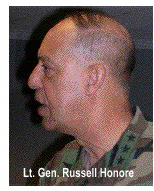 "I'll
tell you this," Nagin said, "I'll give
the President some credit on this. He sent one John Wayne dude
that can get stuff done. His name is [Lt.] Gen. [Russell]
Honore. He came off the doggone chopper, and started cussing
and people started moving. He'll get some stuff done. They ought
to give that guy—if they don't want to give it to me—full
authority to get the job done. We'll save some people."
"I'll
tell you this," Nagin said, "I'll give
the President some credit on this. He sent one John Wayne dude
that can get stuff done. His name is [Lt.] Gen. [Russell]
Honore. He came off the doggone chopper, and started cussing
and people started moving. He'll get some stuff done. They ought
to give that guy—if they don't want to give it to me—full
authority to get the job done. We'll save some people."
Asked if he thought the President was serious when he held his press conference, Nagin said the president "...can't do anything until Blanco requests him to do it." The reporter acknowledged knowing that Posse Comitatus prohibited the federal government from stepping in without a State request for assistance, asking: "Do you know whether or not she's made that request?"
Nagin shrugged. "I don't know," he admitted. "I don't think so. We called for martial law when we realized that the looting was getting out of control and we redirected all of our police officers back to patrolling the streets...I'm telling you right now, [the news media is] showing all these reports of looting—people doing all that weird stuff. And, they are doing that. But people are desperate. They're trying to find food and water...the majority of them. You have some knuckleheads out there, taking advantage of the lawlessness—this situation we can't really control, and they're doing some awful, awful things. But that's a small amount of the people. Most people are looking to try and survive."
Nagin apparently holds the same view as Fox News' Bill O'Reilly who refused to call breaking into stores to steal food, water and a change of underwear, "looting." I looked for the waiver in the 7th Commandment but I couldn't find one. Converting something that does not belong to you for your own personal use—regardless of your "need"—is stealing. Stealing is stealing—even if you need the "loot" to feed your family. (Don't get me wrong. If I was in that place, at that time, under those circumstances—and there was no place to buy water or food—there's no doubt in my mind that, even knowing it was wrong, I would still take care of my family. But I know that just because I could claim the moral high ground does not make the crime any less immoral.) Stealing is still stealing. Plain and simple, its wrong.
But the media pundits who, almost universally, are able to excuse the theft of water, food and clothing, were clear in their minds that stealing plasma TVs, video games and players, jewelry, guns and other nonessential merchandise was looting.
That raises the last, unanswered question about why otherwise reasonably honest citizens could become thugs and thieves, using Katrina as an excuse to loot, pillage, rape and destroy human life. While much of the gun violence reported throughout New Orleans was gang-related, there appears also to be many instances of people firing at medivac helicopters not to kill or harm those on board, but to say, "Come and get my family." The National Guard soldier who was wounded in the leg at the SuperDome was shot as he struggled with a flood refugee trying to steal his rifle—to protect his own family. Commenting on the incident, New Orleans police captain Ernie Demmo said, "These are good people—they're just scared people."
Military helicopters delivering food and water to the people outside the convention center across from the SuperDome were mobbed by crowds of displaced people demanding that they take them to safety. After the first rush on one of the relief helicopters, the troopers began hovering about ten feet or so above the crowds, dropping cases of water and food, then flying away. That meant the biggest and strongest people on the ground got all the food and water. Those who needed nurishment and fluids most but were unable to fight, got nothing.
For all practical purposes, New Orleans had become a primeval concrete jungle—survival of the fittest. The old and the weak died. An old man in a chaise lounge at the SuperDome lay dead for days. No one bothered to move him out of the crowd. An elderly woman lay dead in her wheel chair. Another body lay, covered in a dirty sheet, beside her and glazed-eye, parched and hungry people, hardened to the death around them, filed past them in search of a mouthful of water or a morsel of food as flies, attracted to the rotting bloating corpses, buzzed around them in the stifling heat.
What happened to the people of New Orleans during the horrors of surviving the flood that elicpsed the nightmare of Katrina? Most of the people of New Orleans evacuated the city before Katrina's wrath was unleashed on The Big Easy. The 300 thousand people who remained behind were largely either the elderly or the sick who could not easily leave, or those who survived in the city's publc housing projects and couldn't afford to leave. Many of those who elected to stay behind were young, healthy, and prepared to defend their property from looters. Most of them had survived other hurricanes and knew the flood waters would recede in two or three days and life would resume. Most of them had stockpiled enough food and water to survive those few days. Only, when the levees broke, Lake Pontchartrain reclaimed the land upon which their homes were built. The Corp of Engineers is now fighting to take that land back.
What the TV cameras usually capture in stories of human tragedy around America are ordinary people who rise to the occasion, working together to rescue their neighbors and support each other until help arrives. Instead, what the media saw in New Orleans were flood victims being raped and beaten; corpses littering the streets; looting and rioting; fires that could not start on their own breaking out all over the city; and police and emergency responders being fired upon by mobs that ruled the chaos.
The people who remained behind could be classified in one of four groups: [1] law-abiding, able-bodied citizens who were deliberately barricaded in their partially-flooded homes, armed and ready to defend their possessions; [2] unarmed, law-abiding elderly citizens of modest means or poor but proud Americans with children and family pets who simply lacked the money and/or transportation to leave the city; [3] people who can accurately be described as the former wards of the welfare state in whom dependence on the political system was ingrained; and [4] criminal opportunists who seek human tragedy that will allow them to prey on others.
Louisiana, like Mississippi, Arkansas and Alabama, are considered the generational welfare States of the South. The good ol' boy caste political system of the South is corrupted by four generations of welfare and a steady stream of welfare handouts and patronage jobs that help erode the moral value structure of the welfare recipients over time. What human tragedy exposes when we see the worst in people, whether it's riots in Watts after an injustice against African Americans—white LA cops use excessive force against a black man like Rodney King—is witnessed by America, or destruction of a way of life in The Big Easy, is the psychological consequence of generational welfare.
It's "normal" for neighbors to band together and fight to protect their property in a communal sense, and to overcome the adversity that equally faces the community. Why? Because collectively, their sweat equity created the infrastructure they are fighting to save. Those who contribute nothing to the creation of the community have no sweat equity invested. Thus, they have no communal bond with the infrastructure, so destroying it leaves no sense of guilt.
Likewise, if the livelihood of the citizen comes from the gratuity of the State—and not from being employed by the businesses within the community in which they live—why would they worry if looters destroyed those businesses and carried off the means by which others earn their living? For that reason, looting was a natural reaction by many of those who are accustomed to having the State provide for their needs.
Thus, the real tragedy of Hurricane Katrina is our expoure—as Americans—to a caste system we created by allowing utopian, socialist politicians to ensnare four generations of Americans and chain them to the bondage of a welfare system that robs men of their dignity and their will to transform their own dreams into realities that would empower their children and grandchildren to play pivotal roles in the future of the greatest nation on Earth.
While the American people believed they shattered the cycle of dependency on government by ending "...welfare as we know it" in 1996 when the GOP-controlled House and Senate intruded in the sacrosanct world of entitlements and wiped out welfare as a "career choice." Tragically, because the poverty States did not prepare that segment of their population for life without food stamps and a welfare check, those people were simply left behind as the States grudgingly moved forward.
Tragically today Congress has several pieces of pending legislation that will secretly reassemble the Welfare State during the 109th Congress. Among those bills are HR 240, the Personal Responsibility, Work and Family Promotion Act of 2005 (approved by the House Ways & Means Committee's Subcommittee on Human Resources—March 15, 2005); S.667, the Personal Responsibility and Individual Development for Everyone Act [PRIDE] (approved by the Senate Finance Committee—March 17, 2005); S.456, the Pathway to Independence Act (still in committee—introduced by Lincoln Chafee [R-RI], Gordon Smith [R-OR], Jay Rockefeller [D-WV], James Jeffords [I-VT] and Susan Collins [R-ME].
Unknown to most Americans, when Congress "ended" welfare in 1996, the only way they could be assured that Bill Clinton would sign it into law, was to provide a stop-gap measure to give "temporary assistance" to welfare recipients to help them transition off welfare. That temporary measure became a new permanent welfare system called TANF (temporary assistance for needy families). TANF legislation was designed to provide a 5-year phase out of benefits to generational welfare recipients when it was enacted in 1996. A decade later, the welfare recipients are still transitioning off welfare.
Since the legislation was originally passed, State-level bureaucracies have argued that many welfare recipients are simply not employable in our society due to their own personal "barriers to employment" such as: lack of education and training; substance abuse problems and physical and/or mental health problems. And, while the States won't admit it, two other chronic conditions affect the employability of the many in the welfare class: [a] basic laziness and [b] basic math. Adding food stamps and Medicaid, welfare is far more profitable than the starting pay in a minimum wage environment. Oh yes, one other thing that benefits the State bureaucracies which are predominantly Democratic even in GOP States—the chain that ties the welfare recipient to the bureaucracy is tethered to the voting booth.
What does it all add up to? The chaos and anarchy we witnessed on Fox News and your local liberal network TV stations (if they played it) will be replayed again and again in communities with large welfare populations whenever a crisis of any type develops. It does not have to be a catastrophe caused by a hurricane or a tornado. But, this factor will be omitted from the Congressional hearings the Democrats will be calling for within the next few weeks in order to demonize the President of the United States and by extension, to demonize Bush's appointments to fill the seats of US Supreme Court Chief Justice William H. Rehnquist and Associate Justice Sandra Day O'Connor. The liberals know if they can keep Bush from filling Rehnquist's seat, ultra-liberal Associate Justice John Paul Stevens will be become acting Chief Justice. As the head of the federal judiciary, the Chief Justice of the Supreme Court influences the entire federal court system.

Copyright © 2009 Jon Christian Ryter.
All rights reserved.


